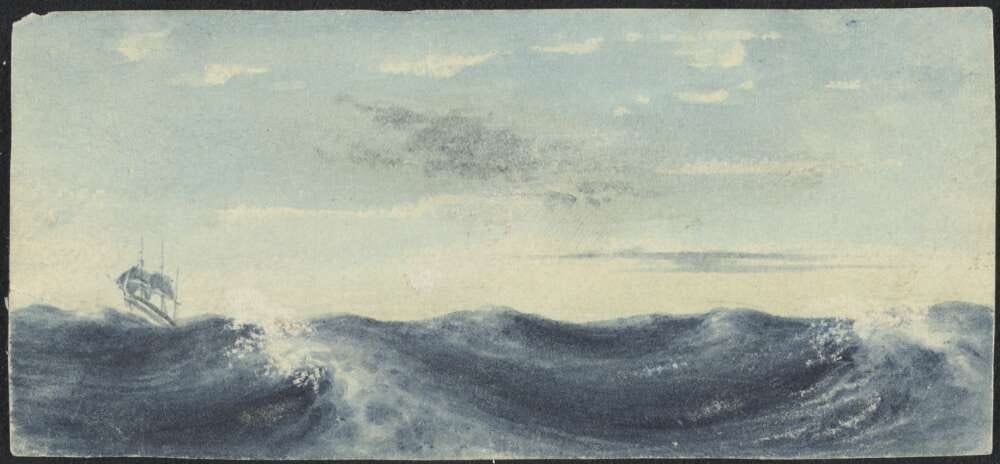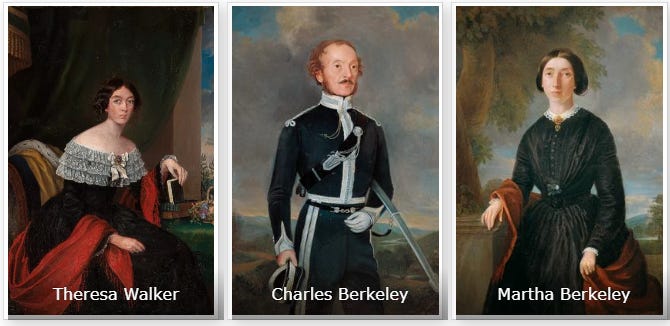When my 3rd great aunt Theresa Chauncy (1807-1876) emigrated to Australia, the voyage from Gravesend to Adelaide lasted 115 days. It was a smooth and uneventful passage, so calm and unremarkable that Theresa complained that she was bored, writing to her father that “… few incidents occurred on board and none of any interest”. She amused herself by composing doggerel verse, peopling it with creatures bearing some imagined resemblance to her fellow passengers and the crew.

Theresa cast herself in the role of a busy bee, buzzing around “[a] Nautilus, Mr. McIntosh, first mate, who wrote a verse as mentioned. The Spider, Mr. Henry Field. The Ant was a pretty young girl, one of the emigrants, with whom the Black Steward was in love, called the Beetle. The Butterfly was Mrs. Wyatt [Julia, wife of the surgeon], whom Field was fond of teasing, and they soused him once in the tub of salt water. She was very fond of sitting on deck by moonlight. Io is the name of a species of butterfly; also another name for the goddess Isis. The Dormouse was Mr. Oakden. The Sphynx was the Captain of the Ship, Captain Linnington. The Dragonfly was Captain Berkeley, who was of the 40th rifles-dress green, black, and red. The Ladybird was Mrs. Berkeley. The Leech was the Surgeon of the ship, Mr. Wyatt. The Cockroach was in its own character in abundance, the Captain did swallow one as he said he would if the ladies would catch it in their hands.”
Theresa’s poem mentions a maid called Fanny. This was Fanny Coombe, later Fanny Finch, became a colourful character in colonial Castlemaine, Victoria.
Some of Theresa’s jibes seem a bit pointed, and it is possible that her satire had its origins in her private frustrations and jealousies. In ‘Colonial Sisters: Martha Berkeley and Theresa Walker, South Australia’s First Professional Artists‘ (1994), the historian Jane Hylton argued, in my opinion unconvincingly, that “Evidence of the tension between the sisters, possibly encouraged by Theresa’s jealousy of her younger sister’s married status, is perceptible in a poem she wrote aboard the “John Renwick” in which she describes Martha in relation to her new husband Charles:
In her manners, the dragonfly’s fierceness beguiled
Of playfulness full, and satirical vein,
Her greatest delight to find fault and complain;
So of lemon and lime juice she’d constantly sip
To sharpen the satire that hung on her lip.

Lines written on board the “John Renwick”
Said the Captain to Miss as he handed her down
From the poop of the "Renwick" of famous renown,
I've just found a tale blown on board by a squall
Concerning the insects of old Renwick Hall.
Fair dames and brave knights, I pray give an ear,
Of love, and of frolic, and fun you shall hear;
For the hue and the cry and the general call
Is for endless amusement in fam'd Renwick Hall.
Each insect contributes its mite to the store
Of poetry, music, or classical lore:
And whether his talents are great or are small,
None are exempted in proud Renwick Hall.
First-a nautilus fain a poem would write,
Forgetting both metre and verse, luckless wight;
'Twas thus he began (looking marvellously blue),
And 'twas thus that he ended-"tis true-tis true.”
The next in succession-a spider would sing,
Please to listen good friends, hear me do the thing;
He told of the loves of an Ant and a Beetle,
One white as a lily, t'other black as a kettle.
He wrote about this, and he raved about that,
But his verses all ended in "vapour and chat."
Full of brag and of teasing he ne'er could be easy
Until in his net he'd mischievously seize ye,
With a mouth gaping wide from his chin to his eyes,
Grinning and chattering, or catching of flies.
A Butterfly lightly now skimm'd o'er the deck
In colours so gay-a ruff round her neck;
Her hair all in plaits, pretty rings on her finger,
Though bright in the sun, in the moon she would linger.
When lo her melody tuned all to please,
How sweetly it sounded in each passing breeze;
But who is the stranger in colour so dingy?
Who but her maid-Fanny Go-bin-gie,*
A constant attendant in each change or move,
Above or below-below and above.
This butterfly oft was vexed and enraged
By the Spider, who teased her whenever engaged,
Till she cried how I wish they would again souse
That fellow so fond of well-peppered Lobs-scouse.
The next was a dormouse, who'd silently crawl
And hide in his berth at each passing squall;
He wrote not nor play'd, but was always much pleased
To see his companion, "Harry long longs," well teased.
'Tis true he was mild in his manners and quiet,
And thought more of business than given to riot;
However, no doubt, with good friends and all that
On a farm in Australia he soon will get fat.
A sphynx for his wisdom, their leader was crown'd
For his skill, and his prowess and knowledge renown'd;
A broad brimmed castor, a jacket of blue,
Grey stockings, white trousers, his nautical hue;
Very loud in his voice, a look salamander,
But good natured with all is this noble commander.
Of stores he has plenty-meat, spirits. and pork,
But the water he swears is now getting short.
To fun much inclined, a poet most witty,
Writes sonnets and verses, both learned and pretty,
And thus makes amusement for all in his turn,
Coining jokes that will warm, but none that will burn.
What sound do I hear? 'tis the dragonfly's hum,
Fierce looks, martial gait, voice loud as a drum:
His colours how gaudy-black, green, and red,
His wings are of gold, a helm on his head.
In the list of the warriors his name you may see,
'Mongst his gaily clad tribe he's a knight of degree.
Like most of his race, he is soon in a pet,
Yet warm hearted withal and prompt to forget;
Tho' rigid and fierce in the dark battle plain,
On his lyre he can tune a melodious strain.
And oft as the butterfly sang to the throng,
He joined with his voice and guitar in the song.
At his side fearless roving a ladybird stayed,
And fluttered around him till anchor he weighed;
When bidding adieu to his country and king,
He sailed with his ladybird under his wing.
This gay little ladybird, gentle and mild
In her manners, the dragonfly's fierceness beguiled
Of playfulness full, and satirical vein,
Her greatest delight to find fault and complain;
So of lemon and lime juice she'd constantly sip
To sharpen the satire that hung on her lip.
Of a Leech I would write, one mild, frank and free,
No sucker of blood but by "Phlebotomy.”
He many bright spots on his vesture display'd,
Tho' most of his race are in sable arrayed:
Of learning and knowledge he had a great store-
Physic, anatomy, zoological lore.
Once on a time a goat's head he dissected,
Each muscle displayed, the bones he collected
To make an addition to his ossified hoard;
But (sad loss to science), 'twas thrown overboard.
A cockroach was seen, but was scouted by all
The rest of the insects of old Renwick Hall.
They would not admit him as one of their number,
But crushed him and killed him as useless old lumber.
His race all denounced, persecuted and followed;
By the sphynx, just for fun, one was actually swallowed.
And last, tho' not least, an humble bee came;
She could boast not of wit, nor of beauty or fame,
But of sweets from each dish she'd endeavour to sip,
And gather refection to tickle her lip.
Of each order and class she fain would indite,
But found that she seldom had talents to write;
On their merits and failings she'd prattle and prate,
And oft with the butterfly sit tête-a-tête.
But the bee has retired to her honeycomb nest,
And the butterfly also has flown to her rest.
And my story is ended, no more can I tell,
So I wish you good evening, and bid you farewell,
In hopes that this poem will furnish you all
With a little amusement in old Renwick Hall.
*Fanny Go-bin-gie: A negro term in songRelated posts and further reading
Chauncy, Philip Lamothe Snell Memoirs of Mrs. Poole and Mrs. Chauncy. Lowden, Kilmore, Vic, 1976.
Hylton, Jane, Berkeley, Martha, 1813-1899, Walker, Theresa, 1807-1876, Art Gallery of South Australia. Board and South Australia. Women’s Suffrage Centenary Steering Committee Colonial sisters : Martha Berkeley & Theresa Walker, South Australia’s first professional artists. Art Gallery Board of South Australia, Adelaide, 1994.
Podcast episode 12: Finding Fanny Finch. (2023). Public Record Office Victoria (PROV). https://prov.vic.gov.au/podcast-episode-12-finding-fanny-finch
The other piece of evidence is that a poem is written on board the John Renwick, which is the ship that Fanny sailed on from London, and on board was an artist by the name of Theresa Chauncey. She’s quite a famous sculptor. With her sister Martha, she wrote a poem and she refers to Fanny as an African woman.
JOHN Renwick 1837. (n.d.). BOUND FOR SOUTH AUSTRALIA – PASSENGERS 1836-1888 by Diane Cummings. https://bound-for-south-australia.collections.slsa.sa.gov.au/1837JohnRenwick.htm
1837 John Renwick. (n.d.). OLD COLONISTS OF SOUTH AUSTRALIA. https://oldcolonists.weebly.com/1837-john-renwick.html
Wikitree:
Henry Field (abt. 1818 – 1909) The Spider
Julia (Darby) Wyatt (1814 – 1898) The Butterfly
Frances (Combe) Finch (bef. 1815 – 1863) Mrs Wyatt’s maid-Fanny Go-bin-gie
John Jackson Oakden (1818 – 1884) The Dormouse
William Linnington (1806 – 1880) The Sphynx
Charles Fitzhardinge Berkeley (1794 – 1856) The Dragonfly
Martha Maria Snell (Chauncy) Berkeley (1813 – 1899) The Ladybird
William Wyatt (1804 – 1886) The Leech
Theresa Susannah Snell (Chauncy) Poole (1807 – 1876) The Bee
This post first published at https://anneyoungau.wordpress.com/2025/01/28/a-busy-bee-lines-written-on-board-the-john-renwick/

